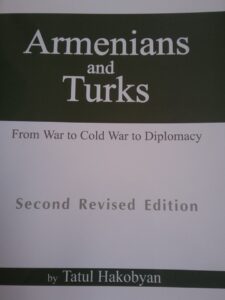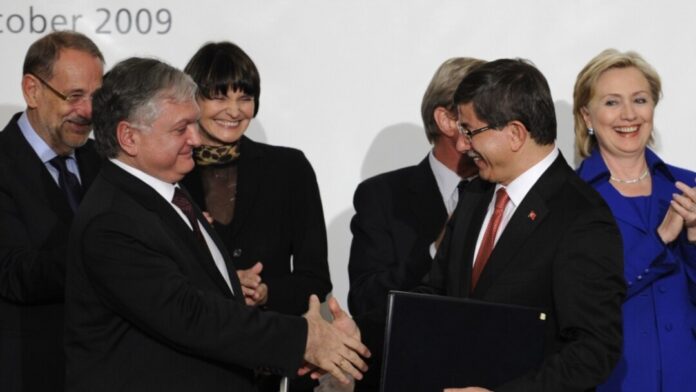From Tatul Hakobyan’s book ARMENIANS and TURKS
On October 10, 2009, a few hours before the planned signing ceremony for the protocols, Serge Sargsyan delivered an address to the people of the Republic of Armenia and to all Armenians. He stated that, “Independence dictates the will and determination to take responsible decisions. It dictates pragmatism and forward-looking, sustained work.”
“That is the road I have chosen,” he went on. “I have done it with a strong understanding of the historical reality and a strong belief in the future of our people.” He further explained that, “The issue of the existing border between Armenia and Turkey is to be resolved through prevailing norms of international law, and the protocols do not go beyond that.… These relations cannot and do not relate to the resolution of the Nagorno Karabakh conflict, which is an independent and separate process.”
“No relations with Turkey can question the reality of the patricide and the genocide perpetrated against the Armenian nation. The relevant sub-commission to be established under the inter-governmental commission is not a commission of historians. Armenia does not regard the clause of the territorial integrity and inviolability of the borders contained in the protocols as in any way related to the Nagorno-Karabakh problem,” the president stated. “Armenia is signing these protocols in order to create a basis for the establishment of normal relations between our two countries. Hence, if Turkey fails to ratify the protocols within a reasonable timeframe, Armenia will immediately take appropriate steps as stipulated by international law.”
On the evening of October 10, the ministers of foreign affairs of Armenia and Turkey, Edward Nalbandyan and Ahmet Davutoğlu, signed the two protocols in the presence of Swiss, as well American, Russian, French, and other European diplomats.
The ceremony was postponed for more than three hours due to last-minute disagreements. Armenia and Turkey finally signed the protocols establishing diplomatic ties after US Secretary of State Hillary Clinton conducted some frantic eleventh-hour arm-twisting and cajoling.
This is how the Switzerland-based journalist of The Washington Post described the event: “While approaching the University of Zurich at the scheduled time, Hillary Clinton heard that the Armenian side was objecting to a Turkish statement prepared for the ceremony. Clinton’s motorcade made a U-turn and raced back to the hotel where a US diplomat was talking to the Armenians. In the hotel parking lot, Clinton sat in her black BMW sedan in a soft rain for about an hour, talking on one phone to the Armenian foreign minister and on another to the Turkish foreign minister, Davutoğlu. Finally, she went into the hotel to invite the Armenian foreign minister, Nalbandyan, to drive with her to the university, where his Turkish counterpart was waiting.”
While Clinton was saving the ceremony from failure, Sergey Lavrov, Javier Solana, and Bernard Kouchner were watching the Russia-Germany football match at the University of Zurich. Being apprised of the situation, Lavrov sent a brief message to Nalbandyan – “Edward, agree to the ceremony without any announcements”. In addition to Lavrov, Solana and Kouchner also signed the message.
After the arrival of Clinton and Nalbandyan, negotiations restarted in a broader format. The sides agreed to sign the protocols on the condition that there would be no statements made afterwards. The linkage between the Armenian-Turkish process and a settlement of the Karabakh conflict was an “open secret,” even though the Turks constantly raised it and the Armenians equally refuted it. The positions of the sides were diametrically different and the Zurich signing ceremony was on the verge of failing, since there was no agreement regarding public statements after the signing.
Clinton told reporters later that Armenia and Turkey each had objections to the other’s prepared statement to be delivered after the signing. In the end, no statements were made at the ceremony. “There was an agreement that the protocols should speak for themselves,” Clinton said in a press briefing soon after the signing. “They have been carefully, painstakingly negotiated over many months. … People are free to say whatever else they want, but let the protocols be the statement.”
After the unexpected and lengthy delay, Nalbandyan and Davutoğlu signed the documents. The diplomats of the powerful states stood behind them, smiling broadly. Having signed it, the Armenian and Turkish foreign ministers stood and shook hands. There was a joyful smile on Davutoğlu’s face; the Turkish diplomat could not to hide his happiness. Nalbandyan was also smiling, but there was tension, sadness, irritation, and even anger beneath his smile.
“Nalbandyan looked like a beaten man, signing under political duress. Davutoğlu’s beaming smile, meanwhile, reflected triumphant happiness over the near-maximum success of his government’s skillful and pushy diplomacy,” wrote the historian Levon Marashlian.
All of Armenia’s former foreign ministers criticised the contents of the protocols, declaring that they would never have signed such a document.
Vartan Oskanian said that,“The Turks are being given everything they have wanted for 17years.” He noted that the Turkish blockade of Armenia was intended to starve the Armenians into concessions in Karabakh, and that it had failed in this purpose. Now, he continued, “Turkey wants to come out of the corner it has painted itself into. It looks like it has found the way. It is doing so at our expense. It wants to open the border, but it’s the Armenian side making the concessions. …Reading these documents, you reach the unequivocal conclusion that they have been negotiated somewhere with the participation of the Turks and have been imposed on the Armenian side. Or else, the Armenian side has actually participated in the negotiations, but it has been deeply inspired and convinced of the view that Armenia’s entire future, its future development depends entirely on the opening of the Armenian-Turkish frontier.”
Alexander Arzumanyan said that he always favoured the establishment of Armenian-Turkish relations, but that he would never have signed such a document. “A process with Turkey had to be started, but not with such concessions. A commission, a sub-commission, on the genocide issue is unacceptable.”
Vahan Papazyan noted, “No matter how much Turkey feigned conceding on this or that issue, the protocols clearly favour the Turks, especially due to the point about the commission. I would never have signed these protocols. I would have resigned.”
With the stroke of a pen, the Armenian president and his foreign minister have crossed the line of danger and dignity, Raffi Hovannisian wrote: “They resigned from a long-standing national quest to preserve the fundamental rights, security, and integrity of an ancient land and its native heirs. The signing of the two diplomatic ‘protocols’ between Armenia and Turkey might indeed constitute the latest entry in the ledger of crimes committed, and covered up, against the Armenian nation. …The soul of our nation is traded away for illusory promises of ‘good will’ and ‘open borders’ with Turkey. This is duplicity, not diplomacy. What will ‘open borders’, a courtesy commonly extended at no cost to all civilised nations, cost the Armenians? The protocols stipulate that Armenia relinquish its lawful historic rights and extend an unlimited de jure recognition of Turkey’s de facto borders, which were drawn and defined on the very basis of the eradication and violent dispossession of the Armenian people from its ancestral heartland. The protocols entail a joint condemnation of terrorism, yet fail to include any corresponding renunciation of the broader criminal outrage of genocide.”
A number of political leaders also criticised the document. The Armenian National Congress described the signing of the protocols as “painful proof of the political bankruptcy and diplomatic shortcomings” of the ruling regime. “With this act of disownment, Armenia’s regime sought to open the Armenian-Turkish border at the price of accepting the idea of an infamous commission to study historical facts and, by doing so, placing the historical reality of the Armenian Genocide under question.”
Along with the ARF, the other two long-standing Armenian political parties condemned the signing of the protocols. The Armenian Democratic Liberal (Ramgavar) Party raised its concern that the actions bearing upon Armenian-Turkish rapprochement “belittle the honour of Armenia.” The Social Democrat Hunchakian Party viewed the signing as a “betrayal of the Armenian people and Armenian statehood”, adding, “Turkey received what it wanted. The Armenian authorities received that which they are worthy of. The Armenian people and Armenia received nothing except a renunciation of the genocide.”
In an interview a few months later, Nalbandyan posed a rhetorical question: “If there were preconditions, why didn’t Turkey ratify it? Except for some oppositionists in Armenia, no one the world over saw any preconditions in the protocols. Even the Turkish prime minister stated that there were no preconditions in the protocols. The political opposition in Turkey criticised the government for negotiating poorly and not including any preconditions in the protocols. The Turkish opposition announced that it wouldn’t ratify the protocols until they included preconditions.”
![]()

Armenians and Turks: Second Revised English Edition was published













